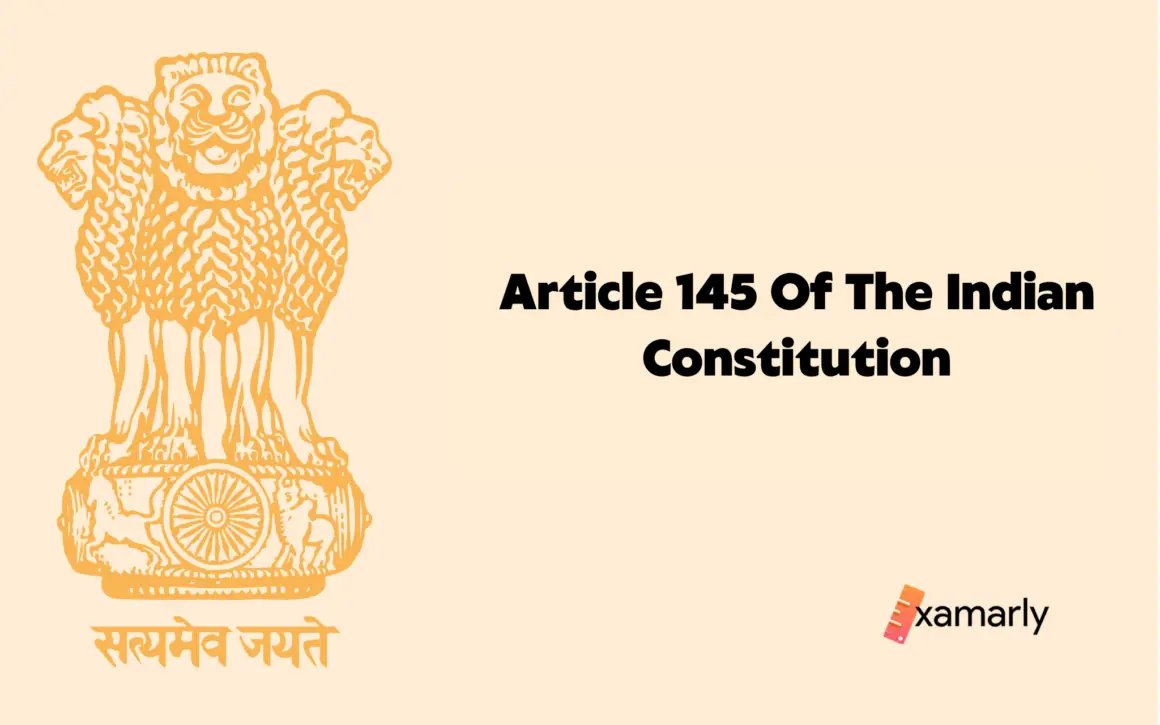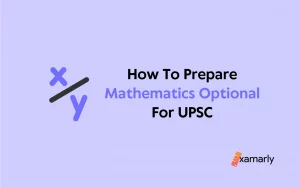Article 145 of the Indian Constitution talks about how the Supreme Court can make rules and laws regarding the persons appointed to the Supreme Court.
It also states that any law enacted by the Supreme Court to govern its own operations and those of its employees must be approved by the Indian Parliament. Also, no rule can be made without approval from the President of India.
- Article 145 Of The Indian Constitution – In Detail
- Summing Up
- FAQs
- Who makes rules of procedure for conducting business in the Supreme Court?
- Who approval is required before making the rules of procedure for conducting business in the Supreme Court?
- When was the Supreme Court of India first inaugurated?
- Which is the highest judicial authority in India whose decisions are binding on all courts?
- How many judges are there in the Supreme Court?
- Who appoints the judges of the Supreme Court?
- Who is appointed as the Chief Justice of India?
- Where is the declared seat of the Supreme Court situated?
- What does the writ of habeas corpus mean?
Article 145 Of The Indian Constitution – In Detail
We will understand Article 145 of the Indian Constitution in detail by analyzing each and every clause present in it.
Clause 1 – As it is & Explained
(1) Subject to the provisions of any law
made by Parliament, the Supreme Court may from time to time, with the
approval of the President, make rules for regulating generally the practice and
procedure of the Court including—
(a) rules as to the persons practising before the Court;
(b) rules as to the procedure for hearing appeals and other matters
pertaining to appeals including the time within which appeals to the
Court are to be entered;
(c) rules as to the proceedings in the Court for the enforcement of
any of the rights conferred by Part III;
1 [(cc) rules as to the proceedings in the Court under 2 [article
139A];]
(d) rules as to the entertainment of appeals under sub-clause (c) of
clause (1) of article 134;
(e) rules as to the conditions subject to which any judgment
pronounced or order made by the Court may be reviewed and the
procedure for such review including the time within which applications
to the Court for such review are to be entered;
(f) rules as to the costs of and incidental to any proceedings in the
Court and as to the fees to be charged in respect of proceedings therein;
(g) rules as to the granting of bail;
(h) rules as to stay of proceedings;
(i) rules providing for the summary determination of any appeal
which appears to the Court to be frivolous or vexatious or brought for
the purpose of delay;
(j) rules as to the procedure for inquiries referred to in clause
(1) of article 317.
The first clause of Article 145 of the Indian Constitution defines all the rules and protocols that the Supreme Court can make regarding its functioning, personnel, procedures, and practices.
All the rules are further defined in the subclauses of the first clause.
(a) The first subclause says that rules can be made for the person practising before the Supreme Court. It can be about their eligibility, education, and preferred academics, among other things that are to be taken into consideration.
(b) The second sub-clause says that rules can be made on the procedures for how an appeal would be heard in the Supreme Court. It also talks about everything related to the appeals, such as if an appeal has to go from the High Court to the Supreme Court, and what the time frame should be for the appeal to get transferred.
(c) The third sub-clause says that rules can be made on the proceedings in the Supreme Court when a case requires the enforcement of the rights defined by Part 3 of the Indian Constitution.
(cc) This sub-clause tells about the rules that are to be made regarding the proceedings under Article 139 A in the court
(d) The fourth subclause talks about the rules that are to be made regarding an appeal that falls under sub-clause (c) of clause (1) of Article 134 of the Indian Constitution.
(e) The fifth subclause talks about the rules that are to be made regarding the review of the judgments that are declared by the Supreme Court and are given to them for the final review. It talks about the protocols related to the time frame of the review application.
(f) The sixth subclause specifies the rules that must be established regarding the costs and procedures of proceedings. If there is a case where a fine must be collected, this sub-clause states that the Supreme Court can make a rule on how much to charge and how it should be charged.
(g) This subclause talks about the rules that are related to how bail should be granted.
(h) This sub-clause talks about the rules that are to be made regarding the hold on proceedings if required.
(i) This sub-clause talks about the rules that are to be made regarding the appeals that are made to the Court just to delay a particular proceeding or hinder the court’s jurisdiction.
(j) This sub-clause talks about the sub-clause that is to be made regarding the protocols for those inquiries that are mentioned in the first clause of Article 317.
Clause 2 – As it is & Explained
(2) Subject to the provisions of clause (3), rules made under this Article may fix the minimum number of Judges who are to sit for any purpose, and may provide for the powers of single Judges and Division Courts.
The second clause of Article 145 of the Indian Constitution says that with reference to clause (3) of this Article itself, any rule made under Article 145 of the Indian Constitution may fix the minimum number of Judges who will be sitting for a particular purpose.
Any rule made under this Article may also provide for the powers and authorities of Single Judges and Divison Judges
(3) [The minimum number] of Judges who are to sit for the purpose
of deciding any case involving a substantial question of law as to the
interpretation of this Constitution or for the purpose of hearing any reference
under article 143 shall be five:
Provided that, where the Court hearing an appeal under any of the
provisions of this Chapter other than article 132 consists of less than five
Judges and in the course of the hearing of the appeal the Court is satisfied that
the appeal involves a substantial question of law as to the interpretation of this
Constitution the determination of which is necessary for the disposal of the
appeal, such Court shall refer the question for opinion to a Court constituted as
required by this clause for the purpose of deciding any case involving such a
question and shall on receipt of the opinion dispose of the appeal in conformity
with such opinion.
The third clause of Article 145 of the Indian Constitution says that the minimum number of judges that will sit in a case where an important question has come up and the Constitution has to be interpreted under Article 143 of the Indian Constitution for the reference will be five.
When the Court hearing an appeal under any provision of this Chapter other than Article 132 consists of fewer than five Judges, and the Court is satisfied during the hearing of the appeal that the appeal involves a substantial question of law concerning the interpretation of this Constitution, the resolution of which is necessary for the disposal of the appeal, the Court shall refer the question for opinion to a Court so constituted.
(4) No judgment shall be delivered by the Supreme Court save in open
Court, and no report shall be made under article 143 save in accordance with an
opinion also delivered in open Court.
The fourth clause of Article 145 of the Indian Constitution says that No Supreme Court ruling shall be rendered except in open Court, and no report shall be filed under Article 143 unless in conformity with an opinion likewise presented in open Court.
(5) No judgment and no such opinion shall be delivered by the Supreme
Court save with the concurrence of a majority of the Judges present at the
hearing of the case, but nothing in this clause shall be deemed to prevent a
Judge who does not concur from delivering a dissenting judgment or opinion.
The fifth clause of Article 145 of the Indian Constitution says that the Supreme Court can’t make a decision or give an opinion unless a majority of the judges who were there to hear the case agree with it.
It also says that however, this doesn’t mean that a judge who doesn’t agree can’t make a different decision or opinion.
Summing Up
We can conclude from Article 145 of the Indian Constitution that the Supreme Court can make rules and protocols for its working and functions.
Everything related to people appointed in the Supreme Court and the working measures of the proceedings can be decided by the Supreme Court itself after taking the approval of the President.
FAQs
Who makes rules of procedure for conducting business in the Supreme Court?
Supreme Court itself makes the rules of procedure for conducting business in Supreme Court.
Who approval is required before making the rules of procedure for conducting business in the Supreme Court?
President’s approval is required before making the rules of procedure for conducting business in the Supreme Court.
When was the Supreme Court of India first inaugurated?
The Supreme Court Of India was inaugurated on 28th January 1950. The Supreme Court followed the Federal Court of India which was founded under the Government of India Act, of 1935.
Which is the highest judicial authority in India whose decisions are binding on all courts?
Supreme Court is the highest judicial authority in India whose decisions are binding on all courts. The decisions of the Supreme Court are binding on all courts because it is at the apex of our judicial system.
How many judges are there in the Supreme Court?
31 judges including the Chief Justice of India. By the Supreme Court (Number of Judges) Amendment Act, 2008, the number of judges has been increased from 26 to 31, including the Chief Justice of India.
Who appoints the judges of the Supreme Court?
It is the President who appoints the judges of the Supreme Court. The Chief Justice of India is appointed by the President on the advice of judges of the Supreme Court and High Court.
Who is appointed as the Chief Justice of India?
The senior-most judge of the Supreme Court is appointed as the Chief Justice of India
In the Second Judges case (1993), it was declared by the Supreme Court that only the senior-most judge of the Supreme Court shall be appointed as a Chief Justice of India.
This practice has been violated twice: in 1973 A.N. Ray was appointed as a CJI and in 1977 M.U. Beg was appointed as a CJI, despite the fact that they were not the senior-most judges of the Supreme Court at that time.
Where is the declared seat of the Supreme Court situated?
The Constitution of India has declared Delhi to be the seat of the Supreme Court.
But the Chief Justice of India, on the advice of the President, can declare any other place to be the seat of the Supreme Court of India.
What does the writ of habeas corpus mean?
the arrested person must be brought before the court, which holds the right to set the person free if the grounds of arrest are found to be faulty.






